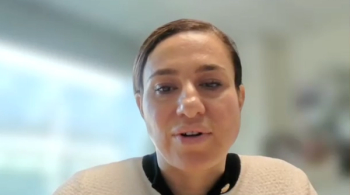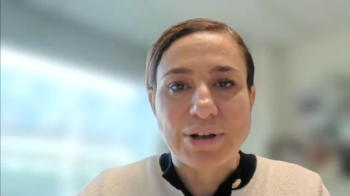
Prostate Cancer
Latest News

Latest Videos

CME Content
More News

The approval is supported by positive data from the phase 3 PSMAfore trial.

“Our results show that by using NeuroSAFE, nearly twice as many men don’t have to face potentially life-changing loss of erectile function after prostate surgery,” says Professor Greg L. Shaw.

“The impact on bone health is really significant with long-term androgen suppression," says Dr Louise Kostos.

“These findings reinforce isodose MHFRT as the standard of care, offering the same cancer control as conventional treatment but with fewer side effects than dose-escalated MHFRT,” says Amar U. Kishan, MD.

“Our study identifies that men who were invited for screening, but do not attend screening appointments are at significantly higher risk of dying from prostate cancer compared to men who were not offered screening or accepted an invitation for screening,” says Renée Leenen MD.

Pocenbrodib is an oral, small molecule designed to inhibit the proteins CREBBP/EP300, which activate genes that promote cancer cell growth and proliferation.

"Radium-223 continues to have a very significant role for patients with advanced castration-resistant prostate cancer," says Rana R. McKay, MD, FASCO.

"Personally, I think monitoring and analyzing PSA kinetics is a great one because it's cheap and it's readily available,” says Dr Louise Kostos.

“The study suggests that exercise would be an effective intervention for men with prostate cancer who express concern about sexual dysfunction, and that exercise medicine should be considered a key part of their treatment,” says Daniel Galvão, PhD.

"4 years following radiation therapy, there is a 25% lower hazard of bowel disorders and a 46% lower hazard of related procedures [in patients who received a spacer],” says Michael R. Folkert, MD, PhD.

The mean absorbed radiation dose to tumors was 8.9 Gy/GBq, compared with 0.27 Gy/GBq in the kidneys and 0.13 Gy/GBq in the salivary glands.

"We need to be aware that patients have options for treatment of high-risk biochemical recurrence, and in order to identify that they have high-risk biochemical recurrence...we need to calculate PSA doubling time,” says Alicia Morgans, MD, MPH.

"A 14-month delay in disease progression is a very meaningful end point to our patients, because that basically means delay in symptoms, delay in fractures, [and] delay in pain in the castration-resistance setting," says Neeraj Agarwal, MD, FASCO.

The goal of the trial is to improve quality of life by identifying patients who can safely reduce or avoid treatment with hormone therapy.

"Considering that almost all patients in the combined treatment group achieved testosterone recovery at 1 year, the results support that this short term (intermittent) combined approach is an optimal option in selected patients with metachronous oligorecurrent hormone-sensitive prostate cancer," the authors wrote.

"In terms of how I select patients, I really look at the timing of metastatic disease, so whether it's metachronous or synchronous and the volume, and I think at this stage, the data are most robust for the synchronous and high-volume patients," says Dr Louise Kostos.

"It is important for us to ask patients whether they want to intensify or not, and not make assumptions," says Alicia Morgans, MD, MPH.

"It was a really interesting paper to develop and write, because over the past decade, there's been such a paradigm shift in the treatment of prostate cancer," says Dr Louise Kostos.

"The primary end point was radiographic progression-free survival, which we reported in 2023, and we updated the radiographic progression-free survival data in 2025," says Neeraj Agarwal, MD, FASCO.

The safety review committee recommended that the phase 2 portion proceed with the 8 GBq dose.

The median OS was 34 months with 177Lu-PSMA-617 plus enzalutamide compared with 26 months with enzalutamide alone.

"I think that 1 of the main reasons physicians weren't necessarily acting is that they weren't getting a full picture of how aggressive the disease was," says Alicia Morgans, MD, MPH.

“As we move through 2025, I think we're going to see more and more expansion of new ideas, new isotopes, and possibly improvement in PET imaging for the future,” says Jason M. Hafron, MD, CMO.

A recap of the FDA submissions and regulatory decisions in urology from February 2025.

"Our findings highlight that completing 5 cycles or more of radium was associated with a 2- to 5-fold increase in overall survival," says Rana R. McKay, MD, FASCO.












